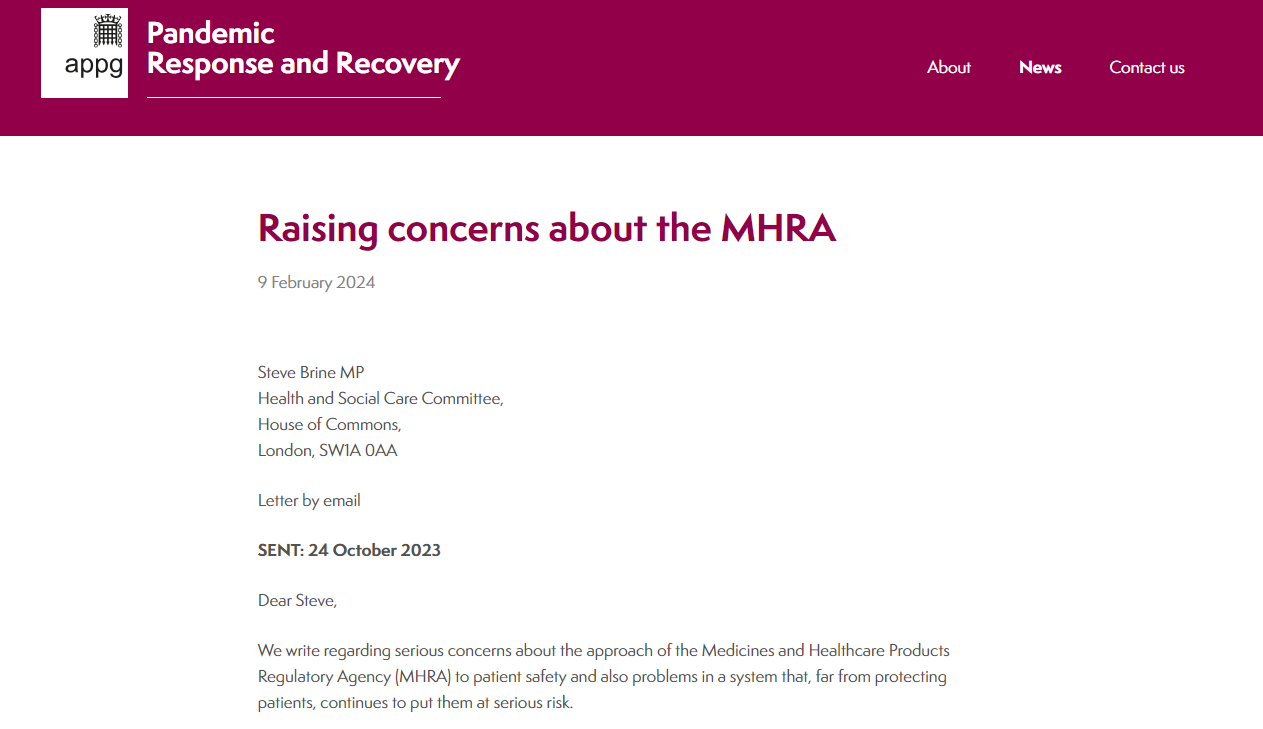25 Parliamentarians Write Letter Raising Concerns About the Medicines and Healthcare Products Regulatory Agency (MHRA)
Not a peep in the press
* Before I begin this post, I have had a number of messages telling me that my newsletter either goes straight into the junk box or isn’t delivered at all. I must be doing something right! But please could everybody check that my newsletter is not marked as spam so that it goes straight to your email inbox *
Yesterday, 25 parliamentarians including MPs, Lords and a Baroness, wrote to Steve Brine, the Health and Social Care Committee raising concerns about the Medicines and Healthcare Products Regulatory Agency (MHRA). The parliamentarians concerns are about patient safety and also problems in the system that put those patients at serious risk.
Wait, this didn’t get reported by the BBC? I’m shocked, they are usually so diligent.
As well as investigations into Primodos, sodium valproate and pelvic mesh, which caused some patients to suffer life-changing or fatal avoidable harm, the letter looked at Covid-19 vaccinations.
We also believe that the MHRA is at the heart of these far wider endemic failings, and that those cited in this letter merely represent the tip of a sizeable iceberg of failure.
They are particularly concerned about two aspects of the system, the Yellow Card Scheme (similar to VAERS) and conflicts of interest and transparency.
With regard to the Yellow Card Scheme they say “it is clear that there is gross under-reporting, and our complaints systems are both too complex and too diffuse to allow early signal detection”.
A 2006 systematic review revealed that possibly only two in every 100 adverse drug reactions (ADRs) get reported to the MHRA. Pharmacists lack interest in it and do not promote direct patient reporting. “In 2018, the MHRA ‘estimated that only 10% of serious reactions and between 2% and 4% of non-serious reactions are reported’.”
The letter suggests that the situation has worsened since then. When comparing Yellow Card reports to hospital reporting of gastrointestinal bleeds over a five year period, only 0.56% were reported.
When it comes to conflicts of interest and transparency, the MHRA admitted in 2020 that there is “a perceived lack of transparency about how the agency makes its decision and the information that it currently provides.”
A 2004-5 House of Commons Health committee found that “the MHRA was unusual in being one of few European agencies where the operation of the medicines regulatory system was funded entirely by fees derived from services to industry”.
Freedom of Information (FOI) requests submitted to the MHRA are routinely unsuccessful. Between 2008 and 2017, only 41% of requests were successful and since 2019 only 76% of requests are answered within the 20 working days statutory response time.
A review recommended that “the register of the General Medical Council (GMC) should be expanded to include a list of financial and non-pecuniary interests for all doctors…In addition, there should be mandatory reporting for the pharmaceutical and medical device industries of payments made to teaching hospitals, research institutions and individual clinicians”. The authors of the letter think that a separate, dedicated register for conflicts of interest is what is required.
Neither a lack of transparency nor conflicts of interest promote the sort of environment needed to fulfil a statutory duty to protect patient safety or crucial for maintaining the public’s trust.
The letter states that the MHRA does not attempt to assess or compare the safety of different vaccines, due to inadequate reporting in the system which prevents any analysis. It also wonders what Dame June Raine, the CEO, meant when she boasted that the agency has transitioned from “the watchdog to the enabler”.
Moving on the Covid vaccines, the authors criticised how the MHRA dealt with Vaccine-Induced Thrombotic Thrombocytopaenia (VITT) deaths from the AstraZeneca vaccine. There was a Yellow Card signal on 7 February 2021 and European countries suspended the vaccine on 11 March 2021. At the time, the MHRA said it could see no evidence of a link before publishing safety advice on 7 April 2021. By this time, 24 UK citizens had been injected. It wasn’t until 7 May 2021 that the MHRA withdrew the AstraZeneca vaccine for under 40s.
Advertisement of medicines is also discussed, with the letter stating that Government advertisements use of the word “safe” breached the prohibition of this word.
Finally, they say that all these concerns may “pale into comparison” in the light of a 2004-05 Health Committee report. This found that there had been no Select Committee investigation of the industry since 1914. “The regulatory system, the medical profession and Government have all failed to ensure that industry's activities are more clearly allied to the interests of patients and the NHS.”
The letter concludes with concerns that the MHRA is “seeking to bring medicines to market quicker with less pre-approval data and more post-approval research being conducted”.
We feel compelled to conclude that the MHRA has indeed become an enabler for the pharmaceutical industry, with patient safety no longer being its primary concern.
Ouch!






Are any of our institutions fit for purpose - least of all those concerning 'health'?
Undoubtedly, these insitutions and those who serve them, will get what they deserve.
Meanwhile, their victims will continue to be demoralised, robbed and harmed.
And this is precisely why trust in the U.K. health authorities appears to have evaporated amongst those who have been long awake and increasingly amongst the rest.
The U.K. medical and regulatory services needs a wholesale clear out if any trust is to be re-established.
Mind you virtually every U.K. regulator is held in the same state of distrust by the public ie none.